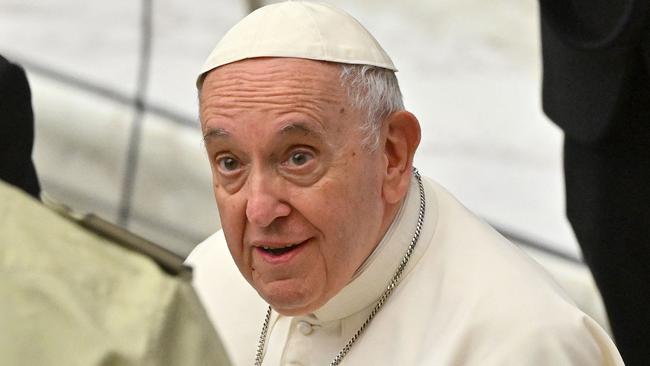NATO is ‘partly to blame’ for Ukraine war, claims Pope
Pope Francis denies he is supporting Vladimir Putin, but says Ukrainians are the victims of a wider geopolitical fight.

The Pope has said Russia’s invasion of Ukraine was partly “provoked” by Nato but denied he is backing President Putin.
He condemned the “ferocity and cruelty of the Russian troops” and praised the “heroism” of the Ukrainians but warned against viewing the conflict as a fairytale battle between good and evil.
The comments, made in an interview with the Jesuit magazine La Civilta Cattolica conducted last month and published yesterday, echo those the Pope made in April, when he suggested that Nato had “facilitated” Russian wrath; drawing accusations that he was giving credibility to Putin’s narrative of the war.
He cited the warnings of an unnamed head of state – “a wise man who speaks little, a very wise man indeed” – who had visited him a few months before the war. “He told me that he was very worried about how Nato was moving. I asked him why, and he replied, ‘They are barking at the gates of Russia. They don’t understand that the Russians are imperial and can’t have any foreign power getting close to them.’ ”
While condemning the brutality of Russian troops, the Pope added that “the danger is that we see only this, which is monstrous, and we do not see the whole drama unfolding behind this war, which was perhaps somehow either provoked or not prevented.”
He insisted that his position did not make him a supporter of the Russian leader. “Someone may tell me at this point, ‘But you are in favour of Putin!’ No, I am not,” he said. “I am simply against reducing the complexity to a distinction between good and bad.”
The conflict was not a Little Red Riding Hood fairytale: “She was good and the wolf was bad. Here is no metaphysical good or bad. What is emerging is something global, involving elements that interlink,” he said, suggesting that larger geopolitical power plays and the global arms trade were fuelling an unnecessary conflict.
The Pope issued a statement after the interview was published condemning the invasion as a violation of a country’s right to self-determination, citing the “direct intervention of a ‘superpower’ aimed at imposing its own will”. This was the closest he has come to condemning Russia as the aggressor.
Ukrainian officials confirmed yesterday that Russian shelling had destroyed the last of three bridges linking the embattled city of Severodonestk to Ukrainian-controlled territory in the west. “Severodonetsk is becoming the new Mariupol,” Serhiy Haidai, governor of the Luhansk region, said. “The Russians totally control most of Severodonetsk. The battles are so heavy that the struggle can last for days, not even for the street, but for only one high-rise building.”
The officials said they still had communication with defenders inside the city but could not conduct any mass evacuation.
Some 12,000 civilians are thought to remain in the city, 500 of them trapped in the Azot chemical plant in an industrial zone under heavy shelling. “The shelling is so powerful that people can no longer stand it in the shelters, their psychological state is on the edge,” Haidai said.
Russia said the fighters in the plant would be given the chance to surrender at 8am Moscow time today. They should “stop their senseless resistance and lay down their arms,” Mikhail Mizintsev, head of the National Defence Management Centre, said.
He added that the civilians would be allowed to leave through a humanitarian corridor but would be transported to Russian-controlled Luhansk, not to Ukrainian territory. Similar pledges have a mixed history of success.
Ukrainian troops still hold Lysychansk, Severodonetsk’s twin city on the western bank of the river, but with all the bridges cut they could be encircled if they cannot cross the water. Damien Megrou, spokesman for a unit of foreign volunteers helping to defend Severodonetsk, said there was a risk of “a large pocket of Ukrainian defenders being cut off from the rest of the Ukrainian troops”, as in Mariupol.
The Pope paid tribute to Ukrainian “heroism”, casting the people as the victims of a wider geopolitical fight. The Russians had miscalculated in thinking the invasion would be over in a week: “They encountered a brave people, a people struggling to survive and who have a history of struggle,” he said
He added: “I would really like to emphasise this point. What is before our eyes is a situation of world war, global interests, arms sales and geopolitical appropriation, which is martyring a heroic people.”
The Times



To join the conversation, please log in. Don't have an account? Register
Join the conversation, you are commenting as Logout